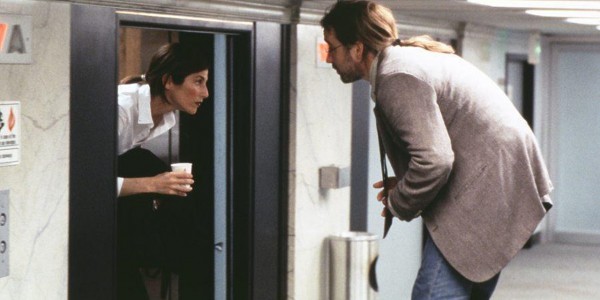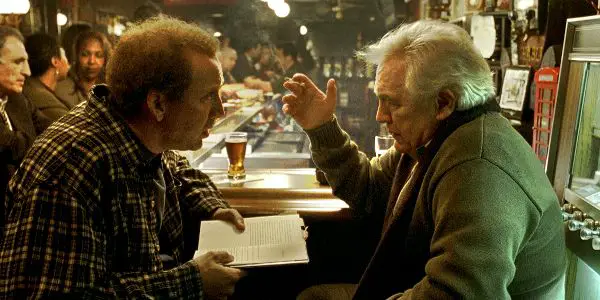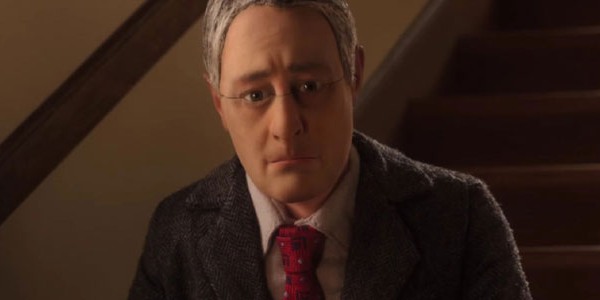The Beginner’s Guide: Charlie Kaufman, Director & Writer

Jack is a recent MA Graduate from the film department…
One of the most acclaimed screenwriters of modern times, writer and director Charlie Kaufman has become known as a pioneer of originality in current cinema – a writer who, with either his highs or lows, has made and written nothing but totally original, and subsequently vulnerable, pieces of work. Rejected multiple times by Hollywood for his surrealistic, original screenplays, Kaufman was finally given his first big opportunity after Francis Ford-Coppola passed on one of his scripts to his then son-in-law, the now successful director Spike Jonze. That script was to become Being John Malkovich, which was the general audience’s first taste of a Charlie Kaufman script. It possibly remains Kaufman’s most popular and successful script to date.
It remains difficult to define Kaufman through one genre and theme – his work is often surrealistic and self-referential, as well as being intrinsically personal and reflective of the man behind the script himself. It would be too simplistic to classify Kaufman’s work as simply ‘weird’ however – they are unconventional scripts that hide basic themes about ambition and mortality, identity and sadness. Being John Malkovich is a highly complex film about the journey to escape one’s identity, Adaptation is a self-referential script about the struggle to write a script and Eternal Sunshine of the Spotless Mind is a journey into the subconscious that simply seeks to say that it is important we remember the good times as well as the bad. It is silly to suggest that these film’s aren’t inherently accessible because they are: Kaufman’s scripts may not be the kind of content that general audiences are used to, but they include ideas and worries and thoughts that every audience member will be familiar with.
Being John Malkovich (1999)
The first of Kaufman’s two major collaborations with director Spike Jonze, Being John Malkovich is a film, ironically, of shifting identities. It is a film totally fixated on the idea of being able to live your life as somebody else, for fifteen minutes at a time and then, theoretically, forever. A film obsessed with the meaning of one’s identity, the right of somebody to change said identity, and celebrity culture. This is a visual text of extraordinary ideas, big ideas; which makes it all the more surprising and alluring that this is, arguably, one of the best screwball comedies of the 1990s.

Through this ever-changing narrative we follow Craig Schwartz (John Cusack), an unemployed and bitter puppeteer who lives with his sweet, if slightly frazzled wife Lottie (Cameron Diaz). After finally finding employment as a filer in the 7 1/2 floor of a anonymous office building, Craig finds a crawlspace that, when entered, allows one to see through the eyes and ears of famous actor John Malkovich (himself) for fifteen minutes at a time. The ethical, practical and financial quandaries of such a power are explored through the film, which ultimately descends into surrealistic and heavily sexualised thematic explorations. Although Diaz herself puts in a transformative performance as the long-suffering wife who finds herself liberated (and almost sexually changed) by her experience inside Malkovich, it is John Malkovich as himself that puts in the film’s bravest, and most startling performance. It is truly a performance that puts himself, physically and socially, in the firing line.
Indeed, the first time I watched this film when I was early in my University degree, I found it a quite frightening, disturbing meditation on identity and freewill, especially when it came to such surrealistic scenes such as the now famous ‘Malkovich inside Malkovich’ sequence. Watching it again, years later, it now appears to be a superbly crafted, ingenious comedy, with zippy one-liners and immensely funny situational humour leaping out of the narrative. It still retains that edge of the frightening unknown but it is through the script’s ability to look inwardly onto itself, to make the complex the absurd at the flick of a switch, that makes it still one of Kaufman’s finest written efforts. It is the early indication, Kaufman’s first major script, that this writer is one of total originality. If anything, things only got stranger and darker in his career from this point onwards.
Adaptation (2002)
Charlie Kaufman followed up Being John Malkovich with a script that feels like an attempt to out-weird, out-meta that previous film. Adaptation is described best as a screenplay about screenplay writing. Part of it, extraordinarily, is about the writing process of Being John Malkovich – Nicholas Cage plays Kaufman himself, straight from the success of his debut writing feature and now struggling to adapt the book The Orchid Thief. The film is billed as a direct adaption of the book but in actuality it is a film about Kaufman’s own struggles to write the book, winding elements of the novel’s narrative with his own personal life. A film about writer’s block has ended up, paradoxically, freeing Kaufman from that same mental ailment – it is neither entirely one thing nor the other, a cinematic experience that appears to write its own narrative in front of the viewer.

The amazing thing about Adaptation is just how well its own messiness works. Cage plays both Kaufman and his fictional twin-brother (credited as a writer of the movie), both of whom have extremely different ideas about story-telling and the film, as a consequence, has two extremely different halves of narrative. The film changes as Kaufman (the character and the writer) changes as well – after hearing at a screenwriting class that using a voice-over is ‘flaccid, sloppy writing”, the constant voice-over that had dominated the film up until that point disappears, never to be heard again. It is a film that influences itself, that is constantly critiquing its own structure and ideas to the point where it will change tone and genre in the blink of an eye : it may not be Charlie Kaufman’s best work, such is the frazzled nature of its own deliberate manner, but it is perhaps his most unique, maybe even his most impressive, purely for ambition of concept.
Eternal Sunshine of the Spotless Mind (2004)
This masterful, heartbreaking romance film from Kaufman and director Michel Gondry is a meditative and solemn exploration of the nature of memory. Its style of filmmaking is tricky and intricate, taking place often in the subconscious workings of the main character’s head, but also has various subplots that are all, bizarrely but beautifully, treated with the attention and love of the main narrative. It remains Kaufman’s most accessible film, due in part to its wonderful dual-lead performances from both Jim Carrey and Kate Winslet,but also for its simple thematic concerns at the heart of its maze-like narrative – that the memories of our lives, both the great and the horrible, are invaluable and cannot be traded for anything.

After breaking up with the beautiful Clementine, Joel Barish is horrified to learn that she has decided to use a new kind of treatment which has wiped her memory of their entire relationship, in a bid to rid herself of their painful last few weeks together. In a misguided attempt at revenge, Joel decides to undergo the same treatment and during the process, changes his mind and tries to fight against it. This is visualised and scripted as a physical fight through the subconscious, through fading memories and painful childhood experiences, memories and images literally disappearing in front of Joel’s eyes.
For all its surrealism and multi-faceted style however, Eternal Sunshine of the Spotless Mind is a remarkably physical film, one grounded in real locations and bound by this wonderful, broken romance at the heart of the narrative. Michel Gondry’s direction is shaky and grainy, giving the real-life sequences the allusion of memory and the journey through Joel’s subconscious the allusion of reality. It is Kaufman’s script, however, so looped and reflective in on itself that remains the film’s most alluring quality; it is a frighteningly personal journey through the mind and the heart, and ends with a scene that one person could interpret as either heartwarming or heartbreaking (I alternate with every re-watch). It was Kaufman’s second Academy Award nomination for Best Original Screenplay – deservedly enough, it was his first and only Academy Award win to date as well.
Synedoche, New York (2008)
For a film that the late, great Roger Ebert hailed as ‘the best film of the decade’, it seems scandalous that not everybody will know of or have seen Charlie Kaufman’s most ambitious, most scathing film of his career. Featuring one of the great virtuoso performances from the brilliant and sadly now passed Philip Seymour-Hoffman, Synedoche, New York, is a sprawling odyssey about scale, ambition and death, mainly set in the bizarre setting of a play within a play. At this stage of his career, it is smart to expect the unexpected with Charlie Kaufman.

Seymour-Hoffman plays Caden; a struggling, depressive theatre director, who gets given an unexpected and life-changing grant for his work after his wife and daughter leave him for Berlin. He rents out an impossibly huge hanger to stage this play, instructing his actors to live out ordinary lives out of free-will inside it as a ‘celebration of the mundane’. His lines between the outside world and the world of the play become increasingly blurred as the project grows bigger in size – these boundaries are only crossed further after Caden begins to employ doppelgängers to tail their real life counterparts, creating an eerie duality throughout the world of the play.
It is an extraordinary directorial debut from Kaufman – despite all of its different thematic messages and subversive imagery, it is perhaps one of the more simplistic, and subsequently tragic, stories that Kaufman has told in his career. Kaufman was given a $20 million for the project and it only bought $5 million back, continuing a pattern of Kaufman’s films potentially being seen as unprofitable or unsuited for mass audiences (a pattern that would indeed continue with Anomalisa seven years later), despite huge critical acclaim. It is a film of shifting ideas and images, a film almost as rambling and anxious as its main protagonist – the tale of this proud and nervous screenplay writer suddenly being given a huge platform to write his stories on could be seen as a mirroring of Kaufman himself, giving the film an extra-meta quality. It remains Kaufman’s most undervalued work, an exhibition in ambition and passion that has been seen and praised all too rarely.
Anomalisa (2015)
This aching animation, Kaufman’s first foray into the medium, is an extraordinary, overwhelming visual and audio experience. When released a lot of natural attention was given to its distinctive visual animated style – a film entirely made out of stop-motion puppets and sets, telling a distinctly bleak and human story about loneliness and isolation in older life. It is the sound-design of the film however, the way voices are handled and changed, the way the world is deliberately designed to sound samey that makes the picture such an amazing experience, and consequently such a disturbing one.

The simple crux of the narrative is that a lonely customer service expert, Michael Stone (voiced by David Thewlis) has lost touch with its own passion and connection to the world around him to the extent that he perceives everybody as having the same face and voice, including that of his own wife and son. The faces take on their own kind of creepy, uncanny-valley quality, through the visuals of the puppets but it is the fact that the voices, all played by Tom Noonan, exhibit this sterile, dull quality that surrounds Michael from all angles. The twist of the narrative, the element that the emotion hinges on, is that Michael meets somebody who looks different, sounds different – the sweet and innocent Lisa, played by Jennifer Jason Leigh. He is fascinated with her, immediately smitten with what he deems to be a special, unique voice, cutting through the dullness of his existence. What he does to capture this voice, to almost possess it in desperation, is what gives the film its simple tragedy.
What is Charlie Kaufman’s best work so far? Some critics have accused him of being too bleak, too emotionless – do you agree? Tell us in the comments below!
Does content like this matter to you?
Become a Member and support film journalism. Unlock access to all of Film Inquiry`s great articles. Join a community of like-minded readers who are passionate about cinema - get access to our private members Network, give back to independent filmmakers, and more.
Jack is a recent MA Graduate from the film department at the University of Southampton. He has been writing about film and football casually since 2013, considering himself as an expert on the works of Akira Kurosawa, Park Chan-wook and Steve McQueen ; less of an expert on every other important director.













